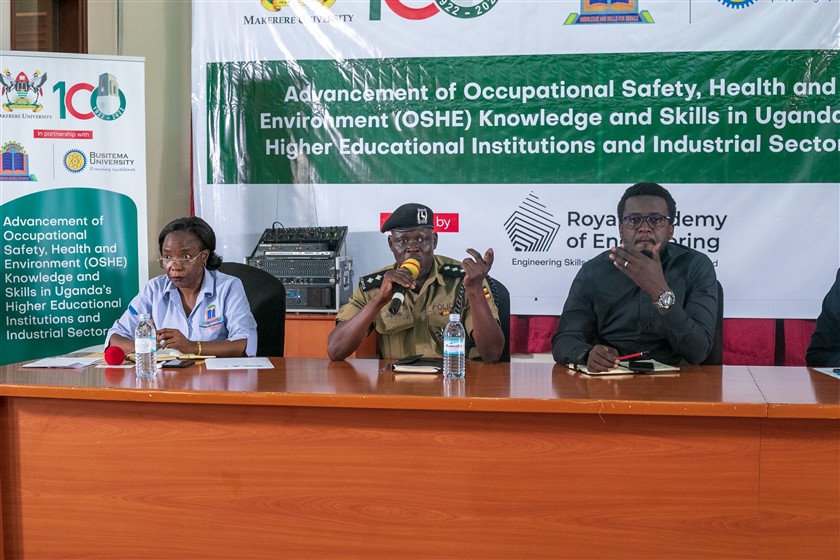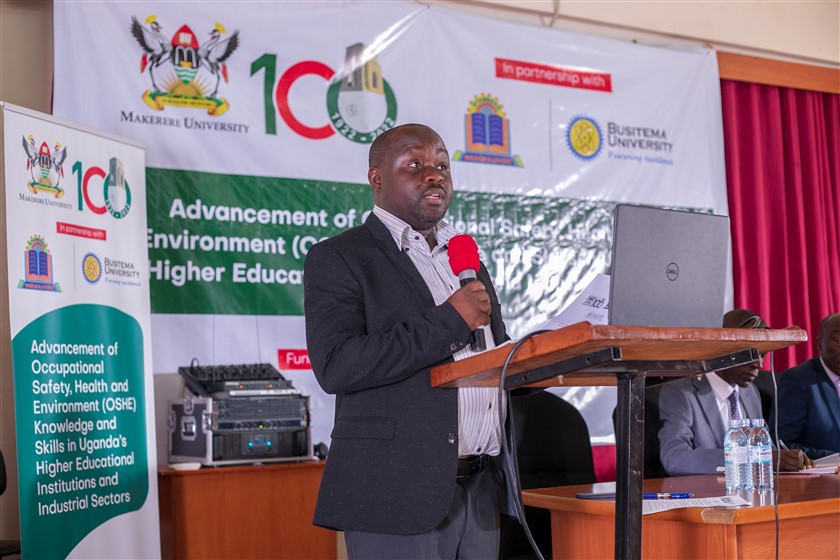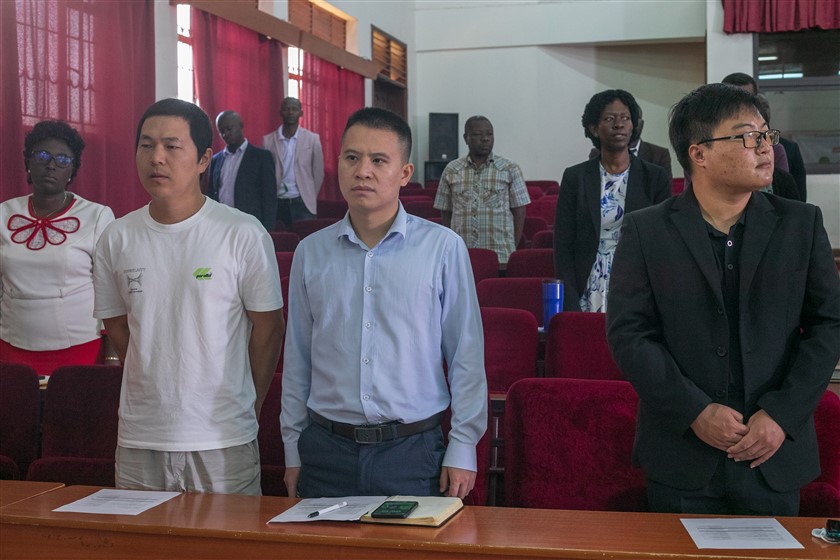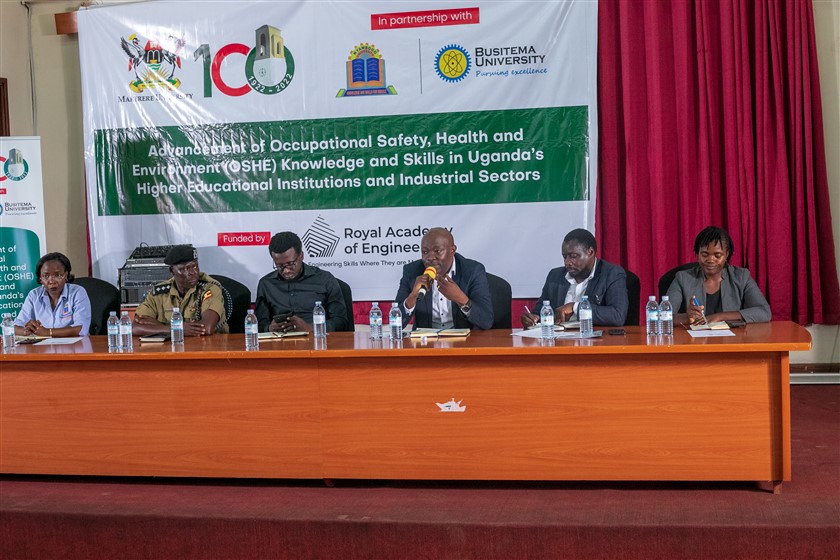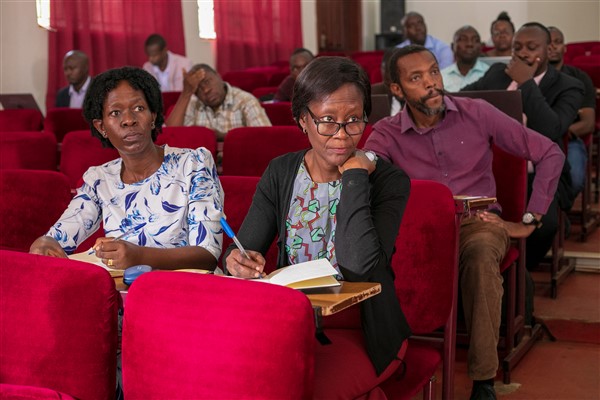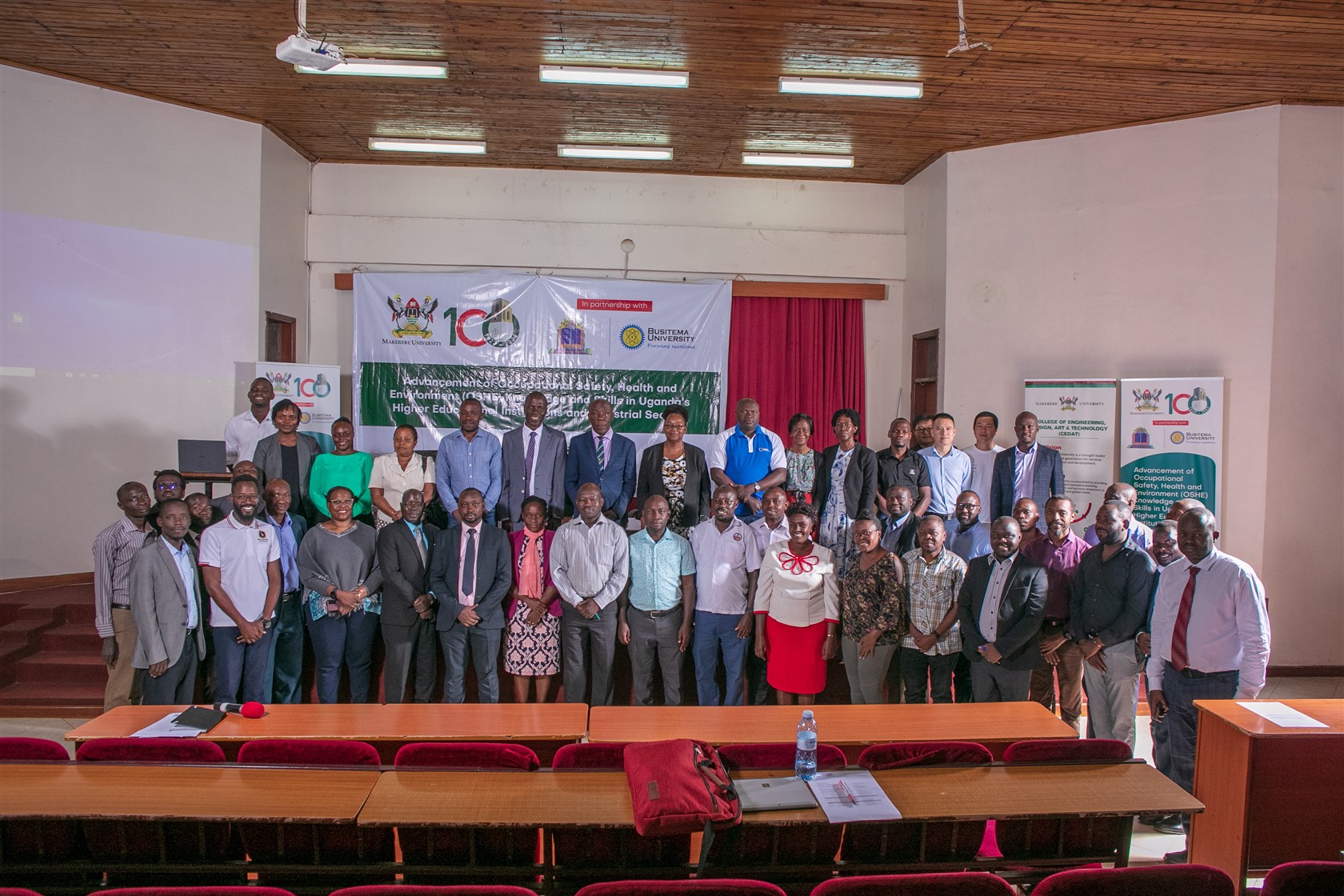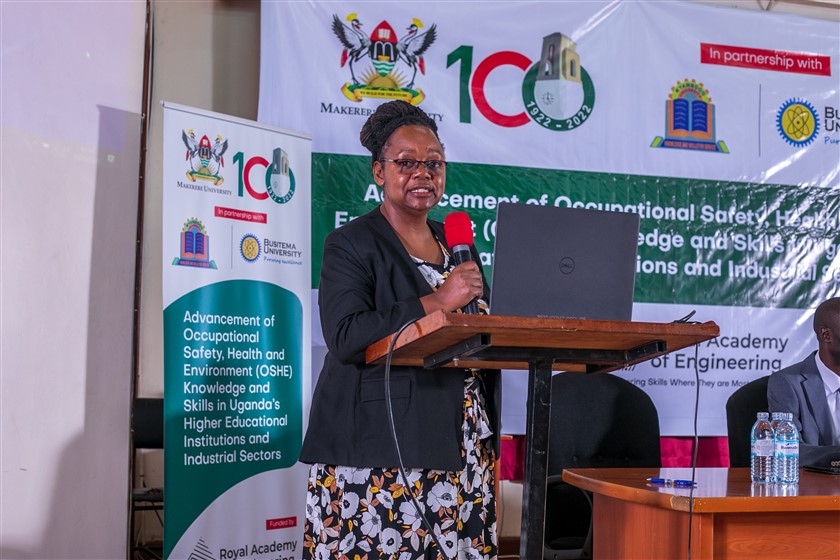
Occupational Safety, Health and Environment (OSHE) Centers of Excellence at Makerere, Kyambogo and Busitema Universities were on 4th May 2023 launched. This was during a Stakeholders Engagement Workshop convened at the College of Engineering Design, Art and Technology (CEDAT) –MakerereUniversity.
The discourse on the Advancement of Occupational Safety, Health and Environment (OSHE) knowledge and Skills in Uganda’s Higher Educational Institutions and the Industrial Sector brought together stakeholders from the Academia, Industry and student community.

The two-year project, currently in its second phase, is funded by the Royal Academy of Engineering under its Engineering Skills Where they are Most Needed programme. Dr. Abubaker Matovu Waswa, the Head, Department of Electrical and Computer Engineering, Makerere University is the project’s Principal Investigator (PI).
According to Dr. Abubaker Matovu Waswa, the key goals of the project are to fill the existing OSHE awareness and enforcement gaps amongst Higher Education Institutions (HEIs) and Industrial stakeholders for sustained Social Ecomonic transformation.
It is anticipated that by the end of thistwo-year project, OSHE will be mainstreamed in engineering students training and industrial activities and that engineering graduates will be able to formulate OSHE policy and implementation frameworks aimed at reducing the number of accidents and fatalities within various industrial settings in Uganda, regionally and globally.
The project, he said, will also enhance the local capacity of OSHE professionals within the established centers of excellence to develop customized industrial solutions throughthe various research and development (R&D) initiatives.
‘We started off with six OSHE champions in the first phase butas of now we have over 50 champions from this workshop. We need to be holistically intentional in terms of OSHE atour homes, on the road while in transit and in the various workplaces.The OSHE ambassadors need to ensure there is a ‘multiplier effect’, he said while urging the stakeholders to create awareness and make good use of the OSHE centers of excellence in order to realizethis multiplier effect.

The Principal – Collegeof Engineering, Design, Art and Technology (CEDAT) who is also the Deputy Vice Chancellor in charge of Finance and Administration, Prof. Henry Alinaitwe, while welcoming the participants to CEDAT commended the funders, the Royal Academy of Engineering that have supported the College for over twelve years through staff and industry exchanges, where staff at CEDAT would go to Industry to gain practical experience and the staff from Industry would come to CEDAT to support the teaching of students.
He commended the stakeholders from the industry forabsorbing the engineeringgraduates whom he said, were the main output of the College. If the industry was not absorbingthe engineering graduates through offering them jobs, the College would be rendered useless.
‘I want you to challenge us, where you think there is need for improvement, please inform us. I also know we engage you during curriculum reviews, please do not get tired, keep giving us the feedback because this review is done every three to four years to enable us remain relevant to the needs of the Industry’, he said.
Prof. Alinaitwe also extended appreciation to the industry for supporting the research agenda of the College when they engage both staff and students by providing data as well as use of equipment in the industry settings. He also made mention of a number of engagements in the knowledge transfer partnerships that the College has with a number of industries and called for increased relations with small to the medium and large-scale companies to enable a trickledown effect to students.
Prof. Alinaitwe regretted to noted that during his training as an engineer, he did not encounter issues of OSHE but pledged to ensure that they gradually get taken on in the course of improving on the academic curriculum.
He further regretted to note that there were incidents of poor quality of work as depicted in the falling buildings. ‘Wecannotput the cost of losing people to anything. We should not relax but put measures to mitigate the cost of losing people’, he emphasized. He attributed this to use of poor quality or adulterated materials, poor designs, construction procedures, absence of construction supervision, neglect of the design approval procedures, with a lot of influence peddling by municipal authorities that handle the approvals and the desire to minimize the construction costs, coupled with a tendency to compromise on the costs of OSHE.
While addressing himself on the topic of Occupational Safety, Health and Environmental (OSHE) issues, he said all these were aimed at protecting the wellbeing of the people. He said safety concerned the immediate consequences like a plumber falling down and breaking a limb. In health he cited the example of people handling and inhaling cement, which would eventually harm their lungs. The environment he explained, was on a larger scale where polluting affects the wellbeing of the wider community including third parties that may not be directly involved in the construction sector.
The Dean – Schoolof Engineering (CEDAT), Assoc. Prof. Dorothy Okello appreciated the participation of the wide range of Government entities and companies that were represented who, she said, were aligned to the three departments that make the School of Engineering namely, Electrical and Computer Engineering, Civil and Environmental Engineering, and Mechanical Engineering.
She expressed the need for the College and other stakeholders to develop the culture of safety andnoted that the OSHE project would behelpful for not only the academia but also the other stakeholders. The role of academia she said, was key in research, community engagements and ensuring that as the graduates leave, they have inculcated within themselves the OSHE culture, becoming the change agents at the respective places of work in ensuring OSHE adoption.
Assoc. Prof. Okello called upon the industry stakeholders to notify the College of the available internship opportunities for engineering students. She said engagement with the industry/community was key for grooming of our students. ‘We can come out as academia with all our theories but the stories would be completed with the industrial experience.’ she observed.
The Dean congratulated Dr. Abubaker Matovu Waswa and his team for the great work that resulted into this second phase of the OSHE project.‘We are looking forward to have such close engagements with the Industry stakeholders, we are open for collaboration in all other areas, she stressed.
During the deliberations, it was agreed that OSHE concerns were pertinent to all stakeholders much as the Industry was driven by the need to make profits. It was agreed that the Centers of excellence at Makerere, Kyambogo and Busitema Universities were important as starting points for engineering studentsto get trained and certification in OSHE.
It was also noted that a number of industrial professionals out in the field were not trained and certified in OSHE and that these were also welcome for training within the centers at affordable costs.
The discussion also delved into some adoptable strategies to ensure increased OSHE recognition anduptake at places of work such as establishing OSHE desks, creating increased awareness about the importance of OSHE, the academia to emphasize OSHE mainstreaming in the curriculum, trade unions to raise advocacy on this as well as strengthening enforcement by the regulators and the Ministry responsible, i.e.,Ministry of Gender, Labor and Social Development.
The stakeholders that took part in the discussion included Kiira Motors Corporation(KMC), Uganda Institute of Professional Engineers (UIPE), Engineers Registration Board (ERB), Mulago National Referral Hospital, Uganda Police Force, Ministry of Gender, Labor and Social Development, Ministry of Trade, Industry and Cooperatives, Ministry of Works and Transport, Uganda Electricity Transmission Company Limited (UETCL), Uganda Electricity Generation Company Limited (UEGCL), Umeme Limited, National Water and Sewerage Corporation (NWSC), MTN Uganda, Airtel Uganda, Uganda Communications Commission (UCC), Uganda National Roads Authority (UNRA), Electricity Regulatory Authority (ERA), Civil Aviation Authority (CAA), Uganda Manufacturers Association (UMA), Vivo Energy, Roofings Group Uganda, Research and Education Network Uganda (RENU), China Communications and Construction Company (CCCC), Directorate of Industrial Training (DIT), Cementers Uganda, Uganda Clays Limited (UCL)among others.

Activities at the three centers of excellence
The three centers of Excellence, with one in each of the partner universities of Makerere, Kyambogo and Busitemawork as independent bodies, and have a leeway in determining their own rules of engagement including prices, charges, tools and related aspects but can seek guidance and support from the hub especially during the project lifespan.
The centers offer a range of services that include Training & certification, Consulting, Workplace inspection and audits, Research, Collection and dissemination of injury and accident data and statistics for students on internship. The centers of excellence will be the certifying body using university specific accreditation and the likes.
In Training and certification partnerships, the centers of excellence will work with Eenersafe Consulting Limited, the project training partner for; the project duration of two years. The training partners is open to training and certifying students and related stakeholders amongst the centers of excellence amidst any existing challenges and internal institutional specific delays
In the Training and certification, the centers willensure that their final year students are trained before they leave.
